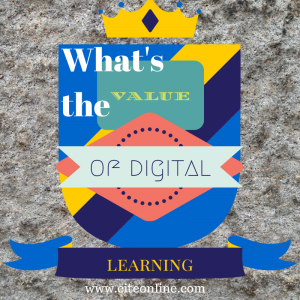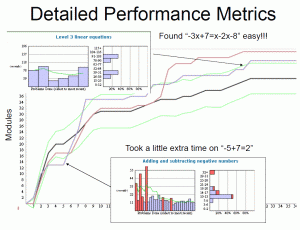The Value of Digital Learning
REPORTING ON DIGITAL LEARNING
 Educators hear about new digital learning opportunities every day. Whole schools are on Twitter (see our article here for a school that’s doing great stuff with social media). It’s tough to keep up with all of the new offerings! Education Week is a great place to get news and reviews. However, we were disappointed with their recent rundown on the merits of one digital learning company.
Educators hear about new digital learning opportunities every day. Whole schools are on Twitter (see our article here for a school that’s doing great stuff with social media). It’s tough to keep up with all of the new offerings! Education Week is a great place to get news and reviews. However, we were disappointed with their recent rundown on the merits of one digital learning company.
Ed Week has another article on digital learning pioneer, Khan Academy’s, latest developments. (Here) But it’s a tremendously disappointing article because it doesn’t provide any insight into the promise and drawbacks of their offerings.
Listen to this post!
What is Khan Academy?
The Khan academy, for those who don’t know, is a digital learning site that provides 100% free lessons covering a broad range of subjects from K-12. It’s a non-profit that grew out of a hedge fund manager’s math lessons that he taught his nephews using Youtube in the Mid 2000’s. It caught the attention early on of people in Silicon Valley and the tech world, including Bill Gates, and has received funding to develop from this world. There are 10 million unique users per month, a very impressive number.
Differentiating Instruction with Digital Learning
 Online digital learning has a lot of promise because it can theoretically be tailored to an individual’s strengths and weaknesses in different ways, depending upon the programming. You could have someone work on their weaknesses by giving them extra practice, for instance. Or you could play to their strengths by letting them do advanced work in the part of math that they are good at, while giving them normal levels of work in the parts where they are average. Or you could tailor the teaching style to match the students’ learning style. At least in theory; the devil is in the implementation.
Online digital learning has a lot of promise because it can theoretically be tailored to an individual’s strengths and weaknesses in different ways, depending upon the programming. You could have someone work on their weaknesses by giving them extra practice, for instance. Or you could play to their strengths by letting them do advanced work in the part of math that they are good at, while giving them normal levels of work in the parts where they are average. Or you could tailor the teaching style to match the students’ learning style. At least in theory; the devil is in the implementation.
And that’s what we need to see in Ed Week. What kinds of choices are the different providers giving to districts and students? What approaches work best or worse with what kind of students? How does digital learning help differentiate education?
Share here!
Problems with Digital Learning?
- Some “educators and researchers complain that the “organization’s instructional materials over emphasize the procedures for solving math problems without enough focus on helping students understand the concepts behind those problems.” There’s no indication that they did any, you know, reporting and actually asked Khan academy for a response to this complaint.
- Second, Ed Week doesn’t explain what the experts mean by this complaint. The process of solving a problem and the concepts behind it can be readily divorced. If you don’t know the concept behind a problem, you won’t know if you are, for instance, supposed to divide or multiply and therefore can’t solve the problem. Ed Week treats this complaint as if it were self evidently true, but it’s not even self evidently clear what the complaint even means.
- Thirdly, and this really gets me going, its beyond idiotic to think that one size fits all. Some students will benefit from one approach, some from a second, some from a third. Is the Khan academy guilty of only using one approach? More or less guilty that other online providers? How does that compare to providers of printed textbooks? What’s the value of digital learning compared to paper?
Digital Learning Competition
Ed Week goes on to point out that Khan Academy will face growing competition in online, interactive education and this will be a problem for them. Competitors? Lions and tigers and bears, oh my. Of course, they will have competition.
Here are the questions that would help educators: What’s Khan’s academy’s approach to this competition going to be? To what extent will that competition be won on the basis of the quality of products, and to what extent on political considerations centering on networks pro and anti “education reform”. That would be interesting, and helpful.
The cost per student of digital learning – Worth it?
Instead they tell us of a competitor who, quelle horreur, charges $45 per student per year for their digital learning English/Language Arts Curriculum. Ed Week makes it sound like this charge is a major issue. In the context of the average cost to educate a student in NY approaching $20,000 (more here), $45 is hardly an issue. Besides, that $45 charge might even offset some of the other spending districts do on Language Arts curriculum.
Please evaluate!
Online digital learning begs to be evaluated, and we need to be informed. How about actually discussing the merits and problems of online offerings in general and the Khan Academy offerings in particular? How about an article that contrasts the different approaches the different providers are using in online education (or the lack thereof). Now that would be an article worth reading for those who are involved in spending curriculum dollars.
Let us know what you think!
What Digital Learning system does your school use? what are the benefits or drawbacks? Tell us on Facebook or Twitter.
Jared Gellert is the executive director for CITE.
If you found this useful, please share it!





